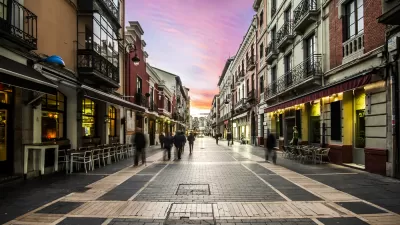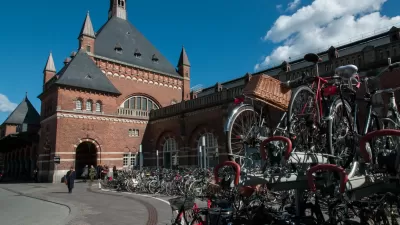From Portland to Minneapolis, cities across the America have been trying to catch up to Copenhagen's world-renowned bicycling infrastructure. With the recent opening of a bike superhighway, the Danish capital is leaving other cities in the dust.
The opening in April of the 11-mile-long cycle superhighway connecting Copenhagen to its western suburb of Albertslund, is the first of 26 routes intended to encourage long-distance bicycle commuting in the region around the Danish capital, reports Sally McGrane. In a city where half of the residents already bike to work or to school every day, the construction of the network of superhighways targets an area ripe for growth in bicycle use - suburban commuters, "most of whom use cars or public transportation to reach the city."
"While there is a good existing network of
bicycle pathways around Copenhagen," notes McGrane, "standards across municipalities can
be inconsistent, with some stretches having inadequate pavement,
lighting or winter maintenance, as well as unsafe intersections and
gaps." Hence, "For the superhighway project, Copenhagen and 21 local governments teamed
up to ensure that there were contiguous, standardized bike routes into
the capital across distances of up to 14 miles."
Although environmental and health benefits are stressed as key advantages of traveling by bike, "[Danish] commuters choose
bicycles because they are the fastest and most convenient transportation
option," writes McGrane. "'It's not because the Danes are more environmentally friendly,'
said Gil Penalosa, executive director of 8-80 Cities, a Canadian
organization that works to make cities healthier. 'It's not because they
eat something different at breakfast.'"
FULL STORY: Commuters Pedal to Work on Their Very Own Superhighway

Maui's Vacation Rental Debate Turns Ugly
Verbal attacks, misinformation campaigns and fistfights plague a high-stakes debate to convert thousands of vacation rentals into long-term housing.

Planetizen Federal Action Tracker
A weekly monitor of how Trump’s orders and actions are impacting planners and planning in America.

San Francisco Suspends Traffic Calming Amidst Record Deaths
Citing “a challenging fiscal landscape,” the city will cease the program on the heels of 42 traffic deaths, including 24 pedestrians.

Defunct Pittsburgh Power Plant to Become Residential Tower
A decommissioned steam heat plant will be redeveloped into almost 100 affordable housing units.

Trump Prompts Restructuring of Transportation Research Board in “Unprecedented Overreach”
The TRB has eliminated more than half of its committees including those focused on climate, equity, and cities.

Amtrak Rolls Out New Orleans to Alabama “Mardi Gras” Train
The new service will operate morning and evening departures between Mobile and New Orleans.
Urban Design for Planners 1: Software Tools
This six-course series explores essential urban design concepts using open source software and equips planners with the tools they need to participate fully in the urban design process.
Planning for Universal Design
Learn the tools for implementing Universal Design in planning regulations.
Heyer Gruel & Associates PA
JM Goldson LLC
Custer County Colorado
City of Camden Redevelopment Agency
City of Astoria
Transportation Research & Education Center (TREC) at Portland State University
Jefferson Parish Government
Camden Redevelopment Agency
City of Claremont




























